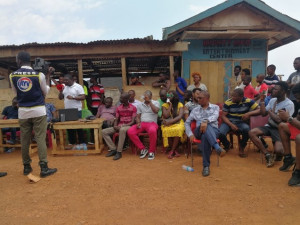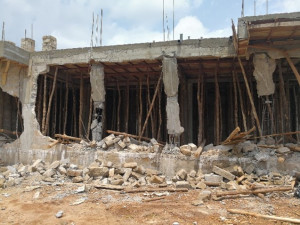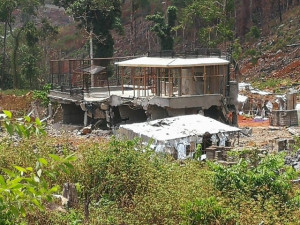By Alvin Lansana Kargbo
In a sharp denunciation of recent demolitions along the Freetown peninsula, the Civil Society Consortium on Community Accountability and Service Delivery has criticized the ongoing actions as unlawful and detrimental to community relations. Established with the aim of fostering accountability and national cohesion, the consortium has expressed alarm over the lack of sufficient stakeholder engagement and dialogue surrounding the demolition process.
The demolitions have left hundreds of individuals homeless, many of whom possess legal titles to their properties issued by the Ministry of Lands. This has sparked outrage among affected communities, who accuse authorities of severe human rights violations.
While authorities attribute the demolitions to the proximity of the GUMA Dam to the affected communities and the purported impact of deforestation on the dam’s water flow, community members contest this reasoning. They argue that the dam is situated far from their residences, raising suspicions of alternative motives behind the demolitions. Furthermore, inconsistencies in the treatment of structures as some demolished while others are left untouched have fueled doubts about the legitimacy of the operation.
The Civil Society consortium, led by William B. M. Sao Lamin, not only condemns the demolitions but also addresses broader concerns regarding deforestation, illegal land grabbing and construction in prohibited zones. Urging an immediate halt to the demolition exercise, they call for the establishment of an independent committee to address land issues and advocate for meaningful engagement with community leaders and stakeholders to achieve peaceful resolutions.
Furthermore, the consortium demands the dismissal of the Minister of Environment and the Director General of Guma Valley Water Company, signaling a need for accountability at the highest levels.
As tensions escalate between the Government and affected communities, the Civil Society Consortium on Community Accountability and Service Delivery pledges to closely monitor the situation to ensure adherence to principles of quality service delivery and accountability.
With pressure mounting on the Government to address grievances, the fate of impacted communities remains uncertain, emphasizing the critical need for transparent and inclusive decision-making processes.







